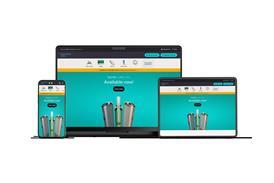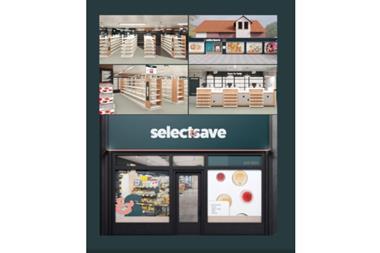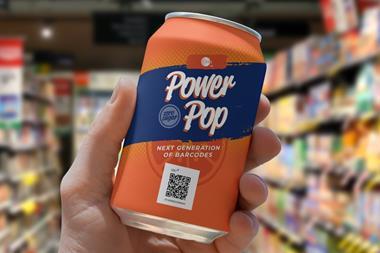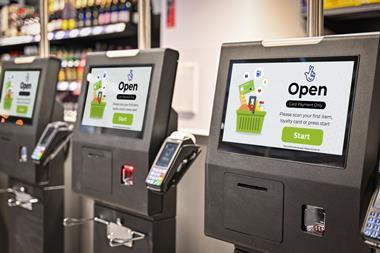Running a c-store business can generate mountains of paper, but retailers are helping to develop systems to let computers take the strain

If you’re reading this sitting in the back office of your store, stop and take a look around you. Are you surrounded by filing cabinets, piles of paper and folders, all containing vital information that you know you might need one day, but not sure when? Did you ever think there might be a better way of doing things?
One Stop franchisee retailer and tech boffin Dee Sedani (main pic) thinks there is. So much so that he has been developing a computer-based store management system called Retail Guardian, which he has helped to devise with firm Woolf IT Services.
“I describe its benefits as being based on four key retailing pillars, which are true for all retailers regardless of size,” he explains. “There is Visibility - I need to be able to see what’s happening in the stores even when I’m not around. There is Productivity - it’s more important than ever to get the most, and the best, out of people. The third is Connectivity - the owner to the staff, and staff to each other. And, finally, there is Responsibility. It is vital we trade within the law, but you need a way of ensuring this happens.”
Retail Guardian is designed to provide a single information hub and task scheduling system to cover every aspect of staff activity in a modern c-store. You can use it to set up, and amend, staff rotas. It scans and stores employee details and the documents they need to work, it integrates with any payroll or accounting system, it records the times when staff clock in and out, and it keeps the owner or manager informed with alerts and notifications that jobs are being done, or if staff members start late or leave early without permission.
There are two parts to the system: the bit the manager sees and the bit the employee sees. For the back office, software is loaded onto the management computer, while for staff on the shop floor there is a tablet version. Both have password access, but also work via fingerprint recognition.
Essential jobs can be systematically compiled and completed. Dee has pre-loaded the system in his store with a variety of jobs and tasks that staff members need to achieve, classified by type. Some jobs might only need to be done once a day, but might be time-sensitive, such as ordering stock before the cut-off time. Others are needed to be done at regular intervals, such as date checks and price reductions on fresh food.
As staff work their way through them, they click them as completed, backed up by a fingerprint scan to show who did what. And if the task is in danger of not being completed on time, an alert is sounded, and a notification sent via text or email to the store owner or manager.
Each job on the list can be linked to a photograph or video, so employees cleaning a section or building a display can be shown instantly which materials to use or what ‘good’ looks like. Staff training can be handled in the same way.
Temperature and moisture monitors in the chillers can be linked into the system, and the system can link to CCTV to facially recognise barred customers.
Important documents, such as the alcohol licence certificate, can also be scanned and retained on the system, so they can be easily retrieved. In fact, anything useful can be scanned and stored, such as equipment engineers’ contact numbers, or POS templates. In this way it acts both as the store’s filing cabinet and its notice board.
“We’ve all got notice boards in our stores, but not everybody reads them. But for important and time-sensitive jobs you can set alerts, so the system will start making a noise if they are not done,” Dee explains.
With the jobs listed on the tablet, and with perfect visibility of which member of staff has taken responsibility for each job, Dee felt able to ban staff using mobile phones on the shop floor - with a subsequent gain in productivity as well as presenting a better image to the customer.
All aspects of due diligence can be covered by the system, because it integrates with existing functions so easily. It can replace the underage refusals register (one click and the refusal is recorded) and the accident book, even storing a photo of the injury to help prove the employer took appropriate action.
Word is spreading about Retail Guardian, with about 50 store systems in place. Most are with independent retailers, but larger groups are also seeing the potential.
Central England Co-operative, for one, is trialling it, although is keeping fairly tight-lipped about progress so far. However Matt Allwood, trading implementation lead at Central England Co-operative, did say: “Retail Guardian allows for the streamlining of processes including payroll, age verification and colleague rota management.
“The Society is taking a detailed look at the system to assess its effectiveness in terms of whether it can support our retail operation.”
For Julian Taylor-Green, of Spar Lindford in Hampshire, who is also testing the system, it is this combination of the different aspects of store management through a single portal that is of huge interest.
“The ability to bring two or three programs together under one roof, and to dial in and view it from wherever you are at the time, is very valuable,” he tells C-Store.
He is still testing the system, but quickly identified the potential for it to log and store due diligence information as of great benefit.
“We had an accident in the store once, and when the safety inspector came he wanted to see evidence of our training. It’s only when you are forced to look for these things you realise that you can be wrapped around boxes and boxes of paper, when our training schedules could be stored electronically instead.”
When he refitted the store recently, the local authority put a condition on his alcohol licence that he needed to give staff refresher training on preventing underage sales every three months, and this is much easier to comply with using an automatic system.
The key thing to understand about a staff management system, of course, is that staff have to be prepared to use it. “You are taking the staff on a journey, too,” explains Julian. “You need to get them to sign up, and also to use it. If you’ve set up a task, they need to understand that the alarm will keep going off until they acknowledge it.”
But there are benefits for staff, too, for example if the store owner has made an error or oversight.
“If you’re busy in the store and agree to give someone a few extra hours, it’s easy to overlook it when you put the wages together at a later date. But if it’s recorded electronically, it’s very quick to look up and confirm if there’s any dispute.”
Of course, nothing comes without a cost, and one of the laws of computing is that you only get good data out if you put good data in to start with. “The first challenge is trying to get all the data on it to start with,” explains Julian. “If you want evidence at the press of a button, you need to have loaded the appropriate documentation beforehand.”
As well as the time commitment, there is a financial outlay, and the Retail Guardian system costs about £1,500 to start with, with an annual licensing fee of about £300 on top.
Other systems are available, too.
Richard Inglis runs three Southern Co-op franchise stores in Hampshire and uses a Parim workforce management system, based in the cloud, to plan staff shifts and make them visible to staff, who clock in and out via their mobile phones or via a tablet in-store.
“Before, we used to have paper rotas and I’d put them onto an Excel spreadsheet, which I would colour code,” he explains. “The amount of times I would get pay queries was ridiculous! Now, people can just check on the system themselves.”
So impressive is Richard’s system, alongside his other technology-enabled processes, that he won the Best Use of Technology award at this year’s Convenience Retail Awards.
But the last word goes to Dee. “In retail it is easy to be a busy fool, to end up spending lots of time on things when there is a quicker alternative available,” he points out.
“The number of calls, emails and texts I get from the staff when I’m out of the store is way down these days. If there’s an issue, they know it’s all in the system, they don’t need to disturb me.”
For more information, visit Retail Guardian
The end of the pen?

Staff at Richard Inglis’ Welcome Frobisher House Southampton store clock in and out via an iPad at the store entrance, or via mobile phone.
The Retail Guardian system uses fingerprint ID recognition so that staff can only log in and out for themselves and take responsibility for their own work. When registering with the system, staff members have their fingerprint scanned; each employee has a password as a back-up.
The fingerprint recognition device can be presented to customers, too, particularly those who are over legal purchasing age, but look younger. The first time the shopper brings in their ID and it is checked as legitimate, the customer’s date of birth can be stored, along with their fingerprint, meaning that they don’t need to bring ID every time as long as they have their finger scanned. All the transactions are logged digitally.
Mobile solutions

Do you want to do it all via your phone? Here are some apps that can take some of the strain - and the paper - away from managing staff.
Deputy
Can handle and organise staff scheduling, timesheets, payroll, and key tasks via a system of spreadsheet templates. You can also tap to recognise and automatically reward top performers.
The app includes a messaging service so employees can communicate with each other, and staff have full visibility of the timesheets so they can highlight when they are free to work, swap shifts and apply for available shifts. A 30-day free trial is available.
Humanity
This app enables shift planning, and has a function whereby staff can clock in and out via their mobile phones, while the business owner is sent notifications and/or alerts.
The app can run holidays and payroll, either using your own or by connecting to a third party, and will also prepare company statistics and sales comparisons in easy-to-read visual graphic forms to check while on the move.
When I Work
Staff schedules and rotas can be entered and updated in a drag-and-drop template. The messaging network allows the store owner to publish and notify the whole team of the schedule, or just selected members, by text. Employee information includes a field for experience and qualifications, so that you can quickly select the right level of experience for each schedule gap. Also available on a 30-day free trial.





















4 Readers' comments